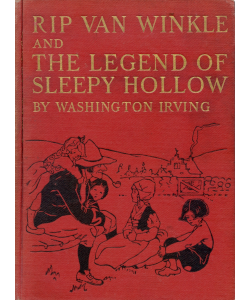Rip Van Winkle and The Legend of Sleepy Hollow

Author:
Washington Irving
Illustrator:
Edna Cooke, Felix O.C. Darley
Publication:
1923 by J.B. Lippincott Company
Genre:
Anthology, Classic Literature, Classical Horror, Fairy Tales, Fiction, Folk Tales, Historic Tales and Legends, Short Story
Pages:
148
Current state:
Basic information has been added for this book.
It has been read but content considerations may not be complete.
Book Guide
Content Guide
Resource Guide
Episode 70: Why Read Fairy Tales?
Released in 2020 by The Literary Life
Available formats: Streaming Audio
Length: 1 hr. 29 min.
View on the The Literary Life site
"Angelina Stanford and Cindy Rollins tackle the topic of fairy stories, discussing the what, why and how of reading them. Angelina shares the distinctive characteristics of fairy stories in contrast to other types of stories, such as myths. They deal with the question of whether fairy tales are 'escapist', the influence of the Grimm brothers scholarly work on interpreting fairy stories, and allowing the story to unveil its deeper truths without forcing meaning onto it.
Angelina gives an illustration of how to see the gospel messages in fairy tales by talking us through the story of Sleeping Beauty. She refutes the ideas that fairy tales are about human romance or are misogynistic. She also highlights some of the Enlightenment and Puritan responses to fairy tales that still linger with us today. Cindy and Angelina also discuss some common concerns such as the magical, weird, or scary aspects of fairy tales. Angelina also makes a distinction between folk tales, literary fairy tales, and cautionary tales."
Rip Van Winkle
Released in 2018 by Close Reads Podcast
Available formats: Streaming Audio
Length: 1 hr. 15 min.
View on the Close Reads Podcast site
Join David Kern, Heidi White, and very special guest Jonathan Rogers (author of The Wilderking Trilogy and The Terrible Speed of Mercy: A Spiritual Biography of Flannery O'Connor, among other books), for a deep-dive into Washington Irving's famous short story, "Rip Van Winkle." Topics include the place of this story in the American literary tradition, Irving's craftsmanship, the conceit/framing device Irving employs, and a whole lot more.
Find This Book
Search for this book used on:





